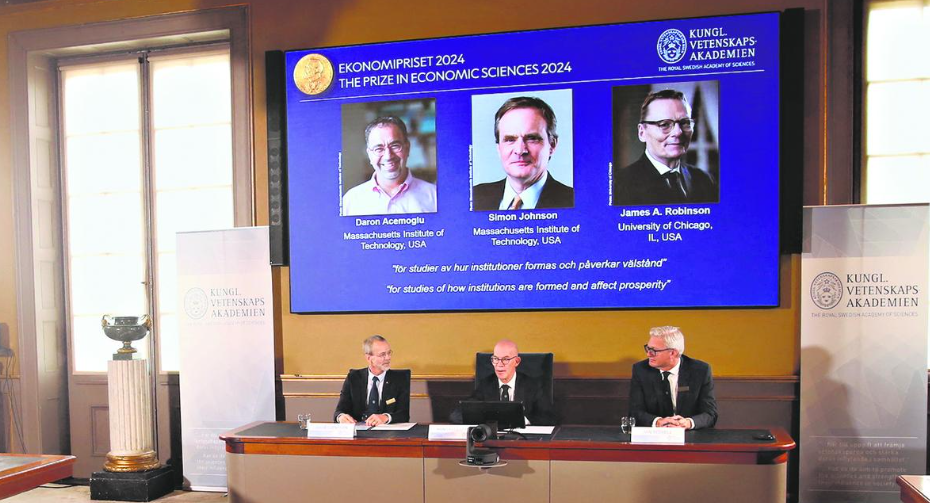Spotlighting the Work of the Nobel Prize Winners in Economics (GS Paper 3, Economy)

Context
- The recent Nobel Prize in Economic Sciences was awarded to Daron Acemoglu, Simon Johnson, and James Robinson (collectively known as AJR), whose influential research focuses on the critical role of institutions in shaping economic development.
- Their work has reignited discussions about the long-lasting impacts of historical institutions, particularly those established during colonial times.
- However, their approach has also attracted criticism for potentially privileging Western liberal institutions over other governance models.
Introduction
- The concept of "The Great Divergence" refers to the significant economic and political disparities that emerged between Western and Eastern nations starting in the 17th and 18th centuries.
- This divergence is attributed to the industrialization of Western Europe, which enabled these countries to exert political and economic dominance globally.
- AJR's scholarship emphasizes that the institutional frameworks set up during colonialism continue to influence economic outcomes long after nations gain independence, affecting their development trajectories.
Institutions and Development
- In their pioneering work within the field of new institutional economics, AJR define institutions as the "rules of the game" that govern social interactions.
- These institutions can include laws, regulations, and norms that prevent the misuse of power and protect individual rights.
- For example, constitutional limits on executive authority can serve to curb abuses of power. AJR argue that institutions operate through incentives, effectively shaping behavior.
- An analogy is drawn to traffic laws: just as fines deter speeding, institutions can encourage lawful behavior and equitable economic participation.
Extractive vs. Inclusive Institutions
One of AJR's significant contributions is their framework distinguishing between two types of institutions:
- Extractive Institutions: These are designed to benefit a small elite at the expense of broader societal welfare. Extractive institutions may lead to short-term economic growth, but they typically perpetuate inequality and limit opportunities for the majority. Historical examples can be found in many post-colonial nations in Sub-Saharan Africa and Latin America, where governance structures prioritize elite interests.
- Inclusive Institutions: In contrast, inclusive institutions provide a more equitable framework that encourages widespread participation in economic activities. These institutions are characterized by property rights, fair political processes, and opportunities for investment. Countries like the United States, Canada, Australia, and New Zealand are often cited as having more inclusive institutional frameworks that foster sustainable development.
Causal Impact on Economic Growth
- AJR have established a clear causal link between the type of institutions a country has and its economic growth.
- Their research utilized archival data to explore historical settler mortality rates, revealing that areas with lower mortality were more conducive to large-scale settlement and the establishment of inclusive institutions.
- For instance, colonists in regions like Australia and the U.S. thrived due to relatively disease-free environments, while those in tropical areas faced higher mortality rates and consequently weaker institutions.
Research Methodology
- A hallmark of AJR's research is their innovative use of natural experiments, which enable social scientists to study variables without direct manipulation.
- This approach allows them to identify observational settings where causes can be compared across different units—be it individuals, communities, or countries.
- By examining these natural experiments, AJR provide robust evidence for the effects of institutions on development, thereby enhancing the validity of their findings.
Investigations in India
AJR's framework has inspired significant research in India, contributing to a deeper understanding of the long-term effects of colonialism on economic development:
- Banerjee and Iyer (2005) conducted a pivotal study demonstrating that land tenure systems established during colonial rule adversely affected agricultural investment and productivity. Areas governed by landlord-based systems showed lower levels of agricultural output long after independence.
- Lakshmi Iyer (2010) explored the infrastructural disparities resulting from colonial rule, revealing that regions under direct British control had fewer schools, health centers, and roads compared to those under indirect rule. This legacy continues to impact development in these areas, although recent efforts are beginning to bridge these gaps.
AJR's findings illustrate the complex interplay between political power—both formal (de jure) and informal (de facto)—and economic institutions. They argue that political power influences the design and reform of institutions, often complicating efforts to transform extractive institutions into inclusive ones.
A Perspective on the Research
- AJR's research emerged during a pivotal shift in the economics profession, which began moving away from universal policy frameworks (such as the Washington Consensus) toward more context-sensitive diagnostic approaches.
- Their skepticism regarding China's growth model—arguing that it may eventually succumb to the limitations of extractive institutions—adds another layer of complexity to their analysis.
Criticism of the Research
- Despite the significant contributions of AJR's work, it has not been without its critiques.
- Scholars like Yuen Yuen Ang argue that AJR's framework often favors Western liberal institutions, overlooking the historical and contemporary realities of governance in other regions.
- They point out that the U.S. had its own share of corruption and exclusionary practices that mirror those seen in some contemporary developing countries, suggesting that the narrative around inclusive institutions is not as straightforward as it appears.
- Furthermore, researchers like Onur Ulas Ince have criticized AJR for not adequately addressing the complexities of colonialism and capitalism.
- They argue that a more nuanced understanding of these concepts is essential for addressing the challenges faced by countries still grappling with the legacies of colonial rule.
Conclusion
- AJR's work has fundamentally reshaped our understanding of the relationship between institutions and economic development.
- Their insights into the long-lasting effects of historical institutions provide valuable context for contemporary economic challenges.
- However, the debate surrounding their findings underscores the need for a nuanced perspective that takes into account the diversity of governance models and historical experiences across different regions.
- As the discourse evolves, it will be crucial to engage with various viewpoints and incorporate them into our understanding of economic development and institutional reform.


